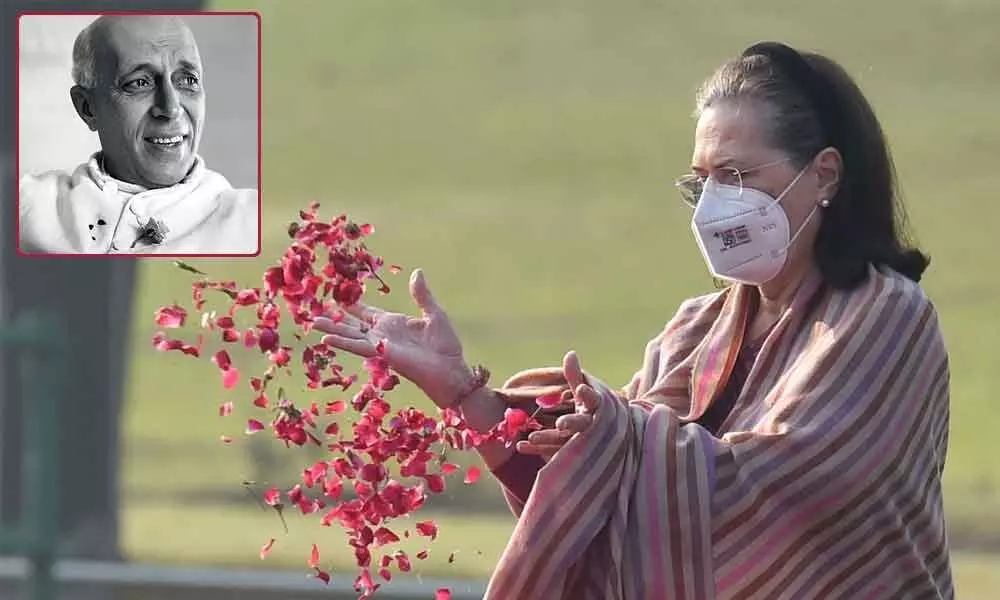Congress pays tribute to Nehru on his birth anniversary

Interim President Sonia Gandhi visited the Shanti Van in the morning to pay her tributes
The Congress leaders on Sunday paid rich tributes to the first Prime Minister of India, Jawaharlal Nehru. Interim President Sonia Gandhi visited the Shanti Van in the morning to pay her tributes.
New Delhi: The Congress leaders on Sunday paid rich tributes to the first Prime Minister of India, Jawaharlal Nehru. Interim President Sonia Gandhi visited the Shanti Van in the morning to pay her tributes.
Former Congress President Rahul Gandhi tweeted: "'What we need is a generation of peace' - Pandit Jawaharlal Nehru. Remembering India's first Prime Minister who greatly valued truth, unity and peace. "
The Congress said, "On Chacha Nehru's birth anniversary, we wish for the bright & prosperous future of each & every child in India.Our commitment to the nation's future is unrelenting."
The Congress leaders paid tribute to its stalwart and from Sunday the party is starting a nationwide agitation against inflation and price rise.
As per pmindia.gov.in, "Nehru returned to India in 1912 and plunged straight into politics. Even as a student, he had been interested in the struggle of all nations who suffered under foreign domination. He took keen interest in the Sinn Fein Movement in Ireland. In India, he was inevitably drawn into the struggle for Independence.
"In 1912, he attended the Bankipore Congress as a delegate, and became Secretary of the Home Rule League, Allahabad in 1919. In 1916 he had his first meeting with Mahatma Gandhi and felt immensely inspired by him. He organised the first Kisan March in Pratapgarh District of Uttar Pradesh in 1920. He was twice imprisoned in connection with the Non-Cooperation Movement of 1920-22.
"Nehru became the General Secretary of the All India Congress Committee in September 1923. He toured Italy, Switzerland, England, Belgium, Germany and Russia in 1926. In Belgium, he attended the Congress of Oppressed Nationalities in Brussels as an official delegate of the Indian National Congress. He also attended the tenth anniversary celebrations of the October Socialist Revolution in Moscow in 1927. Earlier, in 1926, at the Madras Congress, Nehru had been instrumental in committing the Congress to the goal of Independence. While leading a procession against the Simon commission, he was lathi-charged in Lucknow in 1928. On August 29, 1928 he attended the All-Party Congress and was one of the signatories to the Nehru Report on Indian Constitutional Reform, named after his father Shri Motilal Nehru. The same year, he also founded the 'Independence for India League', which advocated complete severance of the British connection with India, and became its General Secretary.
"In 1929, Nehru was elected President of the Lahore Session of the Indian National Congress, where complete independence for the country was adopted as the goal. He was imprisoned several times during 1930-35 in connection with the Salt Satyagraha and other movements launched by the Congress. He completed his 'Autobiography' in Almora Jail on February 14, 1935. After release, he flew to Switzerland to see his ailing wife and visited London in February-March, 1936. He also visited Spain in July 1938, when the country was in the throws of Civil War. Just before the court-break of the Second World War, he visited China too.
"On October 31, 1940 Nehru was arrested for offering individual Satyagraha to protest against India's forced participation in war. He was released along with the other leaders in December 1941. On August 7, 1942 Nehru moved the historic 'Quit India' resolution at the A.I.C.C. session in Bombay. On August 8,1942 he was arrested along with other leaders and taken to Ahmednagar Fort. This was his longest and also his last detention. In all, he suffered imprisonment nine times. After his release in January 1945, he organised legal defence for those officers and men of the INA charged with treason. In March 1946, Nehru toured South East Asia. He was elected President of the Congress for the fourth time on July 6, 1946 and again for three more terms from 1951 to 1954."















